| Srl | Item |
| 1 |
ID:
124234
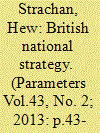

|
|
|
|
|
| Publication |
2013.
|
| Summary/Abstract |
Since 2010, four Parliamentary committees have criticized Britain's failure to promote its capacity for strategy making. Publicly, this failure is identified with the decisions of 2002-03, and especially with the invasion of Iraq. But the 1998 Strategic Defence Review was in trouble before the 9/11 attacks because it was underfunded. More culpable was Britain's failure to learn and adapt in 2006. The formation of the National Security Council by the 2010 coalition has yet to deliver.
|
|
|
|
|
|
|
|
|
|
|
|
|
|
|
|
| 2 |
ID:
124231
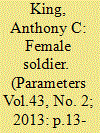

|
|
|
|
|
| Publication |
2013.
|
| Summary/Abstract |
Since the 1970s, women have been increasingly integrated into the military; in Iraq and Afghanistan many women served on the frontline in combat. This article argues women's integration has been facilitated by the all-volunteer professional forces in which individuals are judged purely by competence. Female soldiers have been accepted in all military roles if they perform competently. There are serious limitations in the infantry, however, as only a small number of women pass the selection tests and it is likely no more than one percent of the infantry could be female at present. Moreover, masculine prejudices abound and women are still the victims of discrimination, harassment, and abuse.
|
|
|
|
|
|
|
|
|
|
|
|
|
|
|
|
| 3 |
ID:
124233
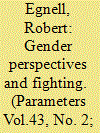

|
|
|
|
|
| Publication |
2013.
|
| Summary/Abstract |
Many concerns related to women in combat roles stem from two related assumption: (a) the existing structure and culture of the armed forces are well adapted to the requirements of combat; and (b) politically imposed change is harmful to the professionalism and effectiveness of the military. These can be dangerous assumptions. Instead, the traditional "truths" about the nature of unit cohesion and the optimal capabilities of individual soldiers and officers need to be periodically examined. Doing so can maximize the effectiveness of military organizations in a changing environment.
|
|
|
|
|
|
|
|
|
|
|
|
|
|
|
|
| 4 |
ID:
124236
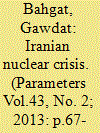

|
|
|
|
|
| Publication |
2013.
|
| Summary/Abstract |
Iran's nuclear program has become the major dispute between the Islamic Republic and global powers, led by the United States. This essay identifies the principal elements in any potential agreement, and outlines the steps needed to enhance the opportunity for a successful negotiation. Rapprochement between Tehran and Washington is not only possible, but indeed, desirable.
|
|
|
|
|
|
|
|
|
|
|
|
|
|
|
|
| 5 |
ID:
124237
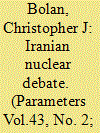

|
|
|
|
|
| Publication |
2013.
|
| Summary/Abstract |
Much of the public debate surrounding US policies regarding Iran has been distorted by myths that obscure the actual status of Iranian nuclear programs. Similarly, discussions about the implications of a nuclear-armed Iran are often built on questionable assumptions requiring more thorough examination. This article dispels these myths, questions these assumptions, and draws important implications for US policymakers in this critical strategic debate.
|
|
|
|
|
|
|
|
|
|
|
|
|
|
|
|
| 6 |
ID:
124235


|
|
|
|
|
| Publication |
2013.
|
| Summary/Abstract |
A decade ago, in the autumn of 2003, a small group of soldiers criminally abused detainees at the Abu Ghraib prison in Iraq. Two divergent narratives explaining these events emerged: a "bad apple" narrative and a "bad barrel" narrative. Neither does justice to the complex interplay of policy, organizational, and individual factors that contributed to these tragic events. A perfect storm of poor leadership, chaotic and confusing policy changes, and a small group of corrupt and immoral soldiers produced this fiasco with global consequences
|
|
|
|
|
|
|
|
|
|
|
|
|
|
|
|
| 7 |
ID:
124230


|
|
|
|
|
| Publication |
2013.
|
| Summary/Abstract |
An increasingly important part of the new American Way of War has been a reliance on standoff technology to project power. The "lure" is minimal friendly casualties and short, inexpensive wars with only limited landpower commitments. Unfortunately, inflated expectations for such an outcome have often led to strategic overreach and a dangerously unbalanced force structure, ultimately costing the nation more blood and treasure. As the United States tries to refocus its strategy and reduce defense expenditures, it must be careful to retain a balanced force with a full range of capabilities.
|
|
|
|
|
|
|
|
|
|
|
|
|
|
|
|
| 8 |
ID:
124239


|
|
|
|
|
| Publication |
2013.
|
| Summary/Abstract |
In a speech delivered on 19 May 2011, President Obama identified the following US "core interests" in the Middle East: (1) "countering terrorism," (2) "stopping the spread of nuclear weapons," (3) "securing the free flow of commerce and safeguarding the security of the region," and, (4) "standing up for Israel's security and pursuing Arab-Israeli peace."1 The US military and intelligence presence in this region are designed to support these objectives and to reassure US allies while deterring potential adversaries such as Iran. Currently, it is not clear if the changes brought about by the Arab Spring uprisings will require the US military to find new ways to protect these interests or what adjustments to US basing and other military activity may be required. The ongoing civil war in Syria and the still unfolding political results in Arab nations that have successfully overthrown the despots that once ruled them add to the uncertainty. Understanding the development and evolution of the Arab Spring is, therefore, an important prerequisite for addressing some key aspects involving future US national security requirements. Fortunately, there are a number of excellent works on the subject that can be useful for US Army professionals and others seeking to do so.
|
|
|
|
|
|
|
|
|
|
|
|
|
|
|
|
| 9 |
ID:
124238
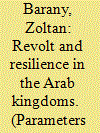

|
|
|
|
|
| Publication |
2013.
|
| Summary/Abstract |
The eight Arab kingdoms, aside from Bahrain, have weathered the Arab Spring with remarkable ease when compared to presidential republics. What explains the relatively modest upheaval and the ruling elites' success in preserving the status quo? This article suggests that the popular legitimacy of the region's monarchies complemented by fragmented political opposition and deep social cleavages limited the appeal of radical revolt.
|
|
|
|
|
|
|
|
|
|
|
|
|
|
|
|
| 10 |
ID:
124232
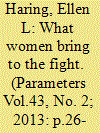

|
|
|
|
|
| Publication |
2013.
|
| Summary/Abstract |
The recent decision to integrate the US military fully was met with a range of emotions. For some it was a misguided decision that would erode combat effectiveness and have negative consequences for US security. Various objections were raised to justify keeping women out of combat units but most have been demolished by ten years of combat. This article exposes the flaws in two of the more persistent objections: (1) the presence of women in combat units will erode the vital bond that develops between men and (2) women are not as strong as men and so put male soldiers at risk.
|
|
|
|
|
|
|
|
|
|
|
|
|
|
|
|